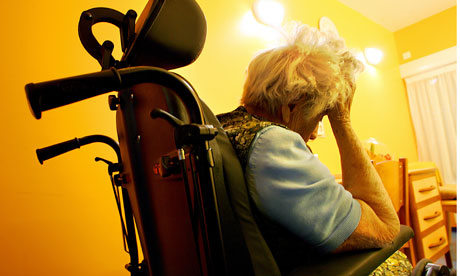
Deaths from Alzheimer's disease and dementia are steadily rising in England and Wales, as cancer, heart attack and stroke deaths gradually come down.
The latest figures from the Office for National Statistics (ONS) show an 11.7% rise in dementia deaths in the last year, 2009-10, to a total of 25,106. More than two-thirds – 18,349 – were of women, in part because they live longer than men.
Alzheimer's and dementia are now the third leading cause of death for women, after heart disease and stroke. Falls in other, more preventable and treatable diseases are largely responsible for a 26% rise in dementia deaths over the five years between 2005 and 2010. In the same period, heart disease deaths dropped by 30% in women. Diseases of the urinary system – also linked to old age – increased by 8.1% in that time and lung cancer deaths rose by 3.5%, as smoking continued to take its long-term toll, but most other trends were down.
Among men, deaths from dementia and Alzheimer's rose by 21% between 2005 and 2010, while liver disease showed the other significant increase – up 3%. As in women, heart disease fatalities fell substantially over the same period – by 26% – but it remains the leading cause of death, killing 40,721 men in 2010 and accounting for 17% of all male deaths. Dementia comes eighth among the leading causes of male deaths, accounting for 7,347 last year.
A spokeswoman for the Alzheimer's Society said: "Statistics such as these drive home the reality that as the number of people with dementia rises almost exponentially we need more research into finding a cure. We are still a long way from understanding how the brain works.
"The increase in recorded deaths could also be explained by an increasing recognition of dementia. Only by giving people a diagnosis and accurately recording a cause of death can we understand the challenge dementia poses."
Great strides have been made in preventing heart disease and stroke in recent years, through the widespread prescription of drugs to lower cholesterol and blood pressure in middle-aged people who are thought to be at risk. More surgery to bypass or expand furred-up arteries and the prompt use of clot-busting drugs for people who have had a stroke have also helped reduce the damage.
There is little in the way of treatment for Alzheimer's and dementia – there are some drugs to reduce symptoms but they are not very effective – and the causes are obscure, so prevention is hard, although trying to stay mentally and physically active in later life is thought to help.
As deaths from treatable diseases fall, other causes of death linked to old age will rise. Flu and pneumonia are the fifth-highest cause of death, diseases that take their greatest toll among the most frail.
The cancer causing the most deaths is lung cancer, mostly as a result of smoking. It was the third leading cause of death in men (16,807 deaths) and fifth in women (13,170 deaths). Breast cancer was seventh, responsible for 10,290 women's deaths, while prostate cancer killed 9,638 men.
Even though numbers of cancer cases are increasing, as people live longer, medical advances have halted what once seemed like an inexorable rise in deaths, and the overall numbers have dropped over the last decade, albeit fairly slowly. The ONS notes that the Department of Health's cancer strategy aims to bring the number of deaths – which are higher than the European average – down by 5,000 a year.

